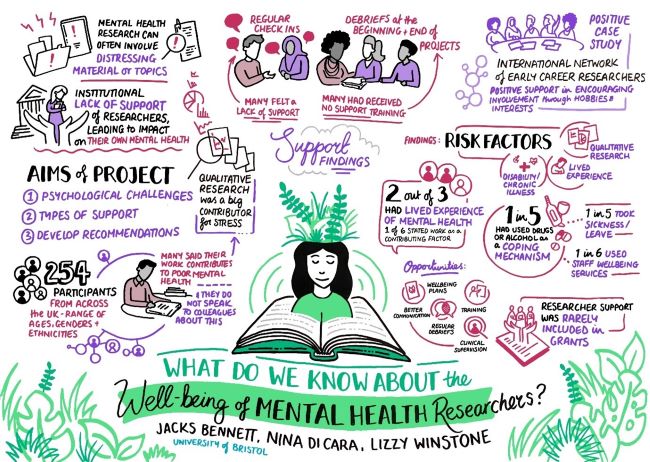Do no harm: Systematic consideration of researcher well-being is critical in mental health research
Mental health research plays a crucial role in understanding, preventing, and treating poor mental health, yet the well-being of the academic researchers conducting this work is often overlooked.
About the research
Many mental health researchers have personal lived experience of a mental health condition and are frequently exposed to distressing material in their work.
However, UK universities lack systematic support to protect their mental health and professional quality of life.
Our study asked over 250 UK academic mental health researchers about their mental health experiences, workplace support needs, and professional quality of life, including burnout, secondary traumatic stress, and coping strategies.
Researchers reported burnout and secondary traumatic stress scores similar to or higher than some frontline clinicians.
Researchers with lived experience of a mental health condition reported significantly poorer well-being, including higher levels of burnout and a greater likelihood of taking sickness leave to cope with work-related distress.
Those conducting qualitative research and those with a disability or chronic illness also faced greater risks.
There were clear gaps between the workplace support researchers need and what is currently provided.
We recommend embedding proactive support into research environments through structured well-being plans, training, project debriefs, and clearer guidance in funding applications.
Key findings
1.High levels of burnout and secondary trauma in academic mental health researchers
- UK mental health researchers report burnout and secondary traumatic stress (STS) scores similar to or higher than some frontline clinicians.
- Levels of STS and burnout match those seen in psychologists during the COVID-19 pandemic and exceed those of Italian hospital staff at the pandemic peak.
- Vulnerability of researchers with lived mental health experience
- Two-thirds of respondents reported lived experience of a mental health condition, which was strongly associated with higher burnout and STS.
- One in five researchers with mental health challenges reported work as a contributing factor, which has implications for institutions actively recruiting lived experience researchers.
- Poorer professional quality of life for qualitative researchers
- Qualitative researchers reported poorer professional quality of life.
- Other research shows the risks of conducting qualitative research can include increased empathising, rumination on safeguarding issues, and a sense of powerlessness.
- Workplace vulnerabilities and contract insecurity
- Researchers on insecure contracts reported lower compassion satisfaction.
- Lack of formal training in managing well-being and the stress of job precarity may contribute to poor mental health outcomes.
- Marginalised and male researchers at greater risk
- Researchers with chronic illness or disabilities are particularly vulnerable to burnout and STS.
- LGBTQIA+ researchers showed an increased likelihood of taking sick leave for mental health reasons.
- Male researchers were more likely to use drugs or alcohol to cope with work-related stress (compared to their female colleagues).
- Limited support and training for researcher well-being
- Nearly half of respondents wanted training in handling challenging research topics, but few had received it.
- Only a small fraction of researchers had access to well-being plans, despite a clear demand.
- One in four endorsed clinical supervision, suggesting a need for structured space for reflexivity and developing strategies for processing emotions resulting from work.
- Need for ethical and institutional oversight
- Some researchers reported thoughts of self-harm or suicide linked to their work.
• Serious consideration – encouraged through ethics committees and grant funding bodies – must be given to adequate assessment of psychological risk to researchers working on mental health topics, like the Declaration of Helsinki provides for research participants.
Recommendations for HEIs
Embed researcher well-being in ethics and funding applications
- Consider researcher well-being in all new research proposals in sensitive fields.
- Ethics committees must formally assess psychological risks for researchers.
Address workload management and hiring practices
- Prioritising stable employment opportunities will be fundamental to systematic consideration of researcher well-being, alongside psychological risk management.
Improve training and professional development
- Training on managing well-being in challenging research should be accessible to all, regardless of specific discipline.
- This should include regular briefings/debriefs, space for reflection and development of strategies to cope with work-related stress.
Enhance workplace support and proactive well-being initiatives
- Researcher well-being plans should be offered as standard practice as a tool for researchers working on challenging topics.
- Structured support including clinical supervision should be accessible where necessary.
Offer targeted support
- Appropriate consideration must be given to researchers with personal mental health or trauma experiences, as well qualitative researchers.
- Similarly, support should be offered to those with additional vulnerabilities (e.g., chronic illness or disabilities) who may be at greater risk.
Wider implications
- Funding bodies should encourage researchers to include costs for supporting researcher well-being in grant applications.
- Sector-wide guidelines for managing researcher mental health should be developed, similar to participant protections under the Declaration of Helsinki.


The authors
Dr Jacks Bennett, ESRC Postdoctoral Fellow, Population Health Sciences, University of Bristol
Dr Nina DiCara, Senior Research Associate, Psychological Science, University of Bristol
Dr Lizzy Winstone, SPHR Postdoctoral Launching Fellow, Population Health Sciences, University of Bristol
Further information
Bennett, J., Di Cara, N. & Winstone, L. Understanding and supporting the mental health and professional quality of life of academic mental health researchers: results from a cross-sectional survey. BMC Public Health 25, 632 (2025). https://doi.org/10.1186/s12889-025-21823-3
Declaration of Helsinki: WMA Declaration of Helsinki – Ethical Principles for Medical Research Involving Human Participants – WMA – The World Medical Association
Researcher wellbeing support and guidance: The Researcher Wellbeing Project (RWP): addressing researcher distress, trauma and secondary trauma
Selected further reading:
Hawke LD, Sheikhan NY, Jones N, Slade M, Soklaridis S, Wells S, Castle D. Embedding lived experience into mental health academic research organizations: critical reflections. Health Expectations. 2022 Oct;25(5):2299-305. https://doi.org/10.1111/hex.13586
McKenzie SK, Li C, Jenkin G, Collings S. Ethical considerations in sensitive suicide research reliant on non-clinical researchers. Research ethics. 2017 Jul;13(3-4):173-83. https://doi.org/10.1177/1747016116649996
Williamson E, Gregory A, Abrahams H, Aghtaie N, Walker SJ, Hester M. Secondary trauma: Emotional safety in sensitive research. Journal of Academic Ethics. 2020 Mar;18:55-70. https://doi.org/10.1007/s10805-019-09348-y
